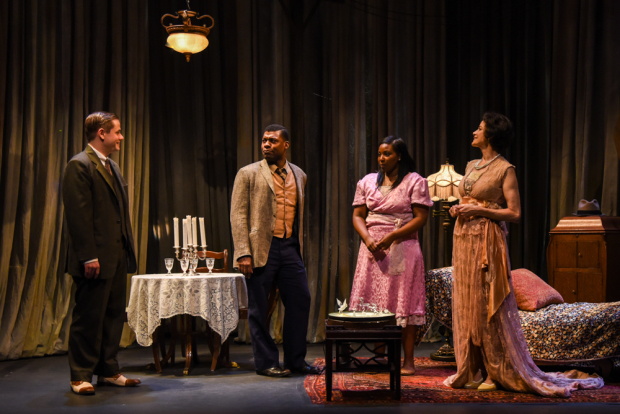The Glass Menagerie

(© Russ Rowland)
The Masterworks Theater Company opens its inaugural season with a production of Tennessee Williams' The Glass Menagerie, helmed by MTC's Artistic Director Christopher Scott, at the 47th Street Theatre. The nascent company presents the American staple as part of its stated mission to "ignite the next generation of audiences," putting classic works in young adults' theatrical and literary vocabularies. They satisfy their mission, in the sense that students venturing to midtown Manhattan will be able to check The Glass Menagerie off their list of required viewing. Unfortunately, beyond this basic service, the production can hang its hat on little else.
Aside from his mixed-race cast, Scott puts forth a straightforward rendering of Williams' four-person memory play, absent most of the "illusion" our narrator Tom (Richard Prioleau) promises us in his opening monologue. Prioleau delivers these recurring speeches with a melancholy gravitas as he ushers us into the Wingfields' tiny St. Louis apartment, where he lives with his overbearing mother Amanda (Saundra Santiago) and painfully shy sister Laura (Olivia Washington, daughter of Tony and Oscar winner Denzel Washington). Once we enter the world of the Wingfields, however, Prioleau loses his commanding presence, transforming into a tantruming child whose profound dissatisfaction with life as a warehouse worker is portrayed as comic insolence. He huffs around the living room, bemoaning his life as the household breadwinner in the midst of the 1930s economic depression — a responsibility unjustly left him after his father (whose portrait looms like a ghost over their chaise lounge) abandoned the family years ago.
Amanda's latest task for Tom is to bring home a "gentleman caller" from the warehouse for his sister. After a bout of anxiety-induced indigestion at the local business college all but rules out financial independence for Laura, Amanda recognizes that her daughter's only hope at financial security is marriage and her son's only clear path to freedom is a solvent man to take his place. Santiago plays Amanda with her traditionally unsympathetic bravado, leaving us craving a few more glimmers of fragility beneath her forced porcelain smile and famously outlandish gown that she breaks out in Act 2 (designed by Dustin Cross all too modestly for my taste). Still, she does convey a hearty amount of desperation through her incessant, lilting speech, as she drives full speed ahead toward life's next challenge.
The most pressing hurdle is dinner with Jim O'Connor (Doug Harris), a dashing young shipping clerk whom Tom has recruited from the warehouse to dine with the Wingfields as Laura's prospective suitor. While Laura has little involvement in the events that swirl around her (and the smallest speaking role of the company), she is the string that tethers everyone to the desolate apartment and the wandering eyes that silently take in her world's imminent destruction. Washington shakes and shivers through her dialogue like a wounded bird but never finds the depth of pain and intelligence that makes Laura such a compelling, tragic centerpiece.
The intimate scene that she shares with Jim in the second act (one of the most heartbreaking in the American theater archives) disappointingly sinks into a numbing lull as they sit in the shadows of designer Joyce Liao's dim candlelight. Jim's words of encouragement — delivered by Harris with all the smooth charm of his famously upstanding character — bring out only the giddy schoolgirl in Washington's Laura, rather than offering her a true moment of freedom that only smashes her to pieces like the fragile figurines in her beloved glass menagerie. It's a moment that should leave you desperate to gather the shards left behind on the Wingfields' living room floor, but instead, stepping over the glass on your way out the door feels like the preferable option.











